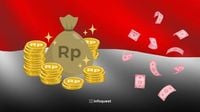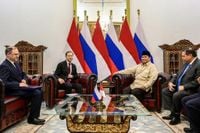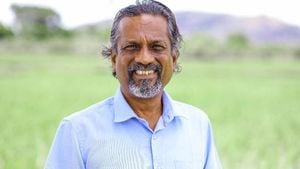On April 17, 2025, Indonesia is taking significant steps to expand its trade and investment horizons by collaborating with Russia and the Regional Comprehensive Economic Partnership (RCEP). This initiative comes in response to the reciprocal tariffs imposed by U.S. President Donald Trump, which have prompted Indonesian officials to seek new markets and partnerships.
The Indonesian Chamber of Commerce and Industry (KADIN) is leading this charge, emphasizing the potential of the Russian market for Indonesian exports. Anindya Bakrie, the president of KADIN, stated, "Indonesia is still looking for new markets for trade, including investment opportunities with Russia." He highlighted that the cooperation with Russia will not only open doors for Russian investors in Indonesia but will also enhance the trade dynamics between the two nations.
In a recent announcement, Bakrie noted that Indonesia is eager to attract more Russian investments, especially in special economic zones across the country. He remarked, "The trade cooperation will open opportunities for Russian investors to invest more in Indonesia, and Indonesia will have alternative markets for trade and investment." This sentiment reflects a strategic shift in Indonesia's approach to international trade, particularly in light of the challenges posed by U.S. tariffs.
On April 15, 2025, Indonesia and Russia formalized their commitment to enhancing trade and investment through the signing of a Memorandum of Understanding (MoU). This agreement marks a critical step in fostering a robust economic partnership. Bakrie pointed out that Indonesia has already been importing a range of products from Russia, including palm oil, machinery, rubber, shoes, coffee, and tea. Conversely, Russia has been purchasing fertilizers and various marine products from Indonesia, indicating a mutually beneficial trade relationship.
As part of its broader strategy, Indonesia is also focusing on its participation in RCEP, which is seen as a vital platform for boosting trade and investment. The Indonesian government aims to leverage this partnership to create a more extensive market for its goods and services. Bakrie stated, "Cooperation with RCEP will help Indonesia have a larger market for trade and investment, supporting our collaboration with the Thai Chamber of Commerce to increase investment in Indonesia." This collaborative effort underscores Indonesia's commitment to diversifying its trade partnerships and reducing reliance on traditional markets.
With the implementation of reciprocal tariffs by the U.S., Indonesia's pivot towards Russia and RCEP is not just a strategic move but a necessary response to changing global trade dynamics. By fostering closer ties with Russia, Indonesia aims to mitigate the impact of U.S. trade policies and secure its economic interests. The Indonesian Chamber of Commerce has expressed optimism about the future of trade relations with Russia, viewing it as a vital opportunity for growth.
As the global economic landscape continues to evolve, Indonesia's proactive approach in seeking new markets reflects its adaptability and resilience. The collaboration with Russia and RCEP is expected to open up new avenues for Indonesian businesses, allowing them to thrive in an increasingly competitive environment. Bakrie concluded, "This partnership signifies our determination to explore new opportunities and strengthen our economic ties with key global players."
In summary, Indonesia's strategic alignment with Russia and RCEP marks a significant development in its trade policy, driven by the need to counteract the effects of U.S. tariffs. As both nations work towards enhancing their economic partnership, the potential for increased trade and investment appears promising, paving the way for a more diversified and robust Indonesian economy.





